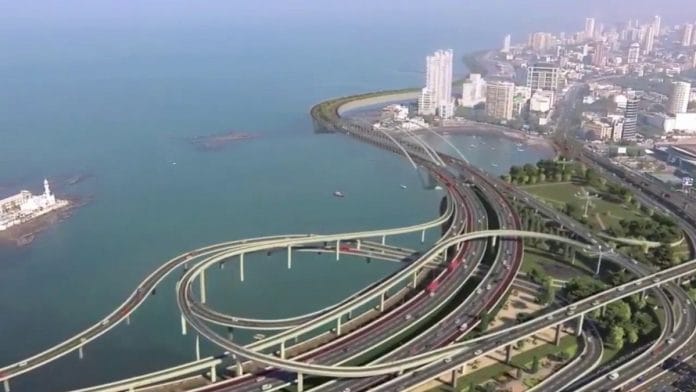New Delhi: The Supreme Court Tuesday will hear applications demanding stay on the reclamation work being done for the Brihanmumbai Municipal Corporation’s (BMC) ambitious coastal road project.
The applications, filed by activists Shweta Wagh and the Conservation Action Trust (CAT) and its executive trustee Debi Goenka, claim that the reclamation work has been going on at a “rapid” and “frenetic” pace, and so, should be stayed until the appeal is heard by the Supreme Court.
Bombay HC order and stay
The Bombay High Court had, in July last year, quashed the CRZ (Coastal Regulation Zone) clearances granted to the Rs 14,000-crore coastal road project.
The high court had ruled that there were several irregularities that had been overlooked by the Maharashtra Coastal Zone Management Authority (MCZMA), the Environmental Impact Assessment (EIA) and the Union Ministry of Environment and Forest (MoEF) while granting permission for the project.
It said that there was a “serious lacuna” in the decision-making process and a lack of proper scientific study in the approval.
The Supreme Court had, however, stayed the Bombay High Court judgment on 17 December last year, “having regard to the factor of balance of convenience; prima facie case and irreparable damage/injury”. This was on appeals filed by the BMC, also known as the Municipal Corporation of Greater Mumbai, Larsen and Toubro and the joint venture between the Hindustan Construction Company and the Hyundai Development Corporation.
The bench, comprising Chief Justice S.A. Bobde, Justice B.R. Gavai and Justice Surya Kant had, however, segregated the municipal corporation’s work into construction of the road on one hand, and the ancillary development of the reclaimed area on the other.
It had then allowed the civic body to go ahead with the building of the road, but had stayed any other development work.
“The petitioners are free to reclaim the land, build the road thereon and secure the road. They shall however not carry out any other development work until further orders of this court,” it ordered, while posting the matter for 8 April 2020.
Also read: BMC’s mangrove math helps Mumbai beat Modi govt’s green diktat
Reclamation work will be over by the time SC hears case
Wagh’s application claims that because of the commencement of the reclamation work, “irreversible damage” is being caused to coastal ecosystems and livelihoods. This work, she submits, is being carried out “at a rapid pace”.
Wagh’s application also says that the reclamation work is being done in violation of the conditions of the CRZ clearance granted on 11 May 2017 for the project.
For instance, it points out that the CRZ required that the municipal corporation should get clearance under the Wildlife (Protection) Act, 1972, as there were corals and gorgonians along the Worli shoreline. This, it says, wasn’t done.
The application further submits that while the CRZ clearance for the project states that no fishing activity should be hampered, the reclamation work has badly affected fishing in the Worli area.
The reclamation work, it says, “is resulting in the destruction of the breeding grounds and habitat of a variety of marine fauna and various small and large fish that come to the shallow coastal areas to breed including lobsters, prawns, pomfret, crabs etc. and resultantly the livelihoods of the fisherfolk”.
The application asserts that the area, “which has historically been a traditional fishing ground for the community will be irreversibly destroyed”, and the reclamation work will be completed by the time the matter is finally heard by the court in April 2020.
Also read: BMC’s ‘blatant oversight’ that has Raj Thackeray’s MNS riled up
Work happening at ‘frenetic pace’
CAT and Goenka’s application demands that the authorities be directed to carry out the reclamation work in a way that would not cause any permanent irreversible damage to the coastline. In the alternative, it demands a complete stay on all reclamation of land until the petition in the Supreme Court is decided.
This application says the reclamation of land has been taking place “at a frenetic pace”, and is being carried out not only for construction of the road but also for other development work, in violation of the Supreme Court’s interim order.
BMC response
Responding to the applications, senior officials from the BMC told ThePrint that the applicants were indulging in “vexatious litigation” and that the “increased delay would cause higher costs, which would, in turn, be recovered from the taxpayers”.
Officials also claimed that only a “miniscule quantity” of corals existed at Worli, and that even these were being protected by not commencing work at these locations. These corals, they said, would be translocated to other suitable locations outside the project area.
They also denied allegations that fishing activities were being hampered, claiming that the navigation channels of fishermen were unobstructed, and that any issues faced by the fishermen would be adequately addressed after consultations with them.
Also read: Collapse of Shiv Sena’s alliance with BJP threatens its control over cash-rich BMC






